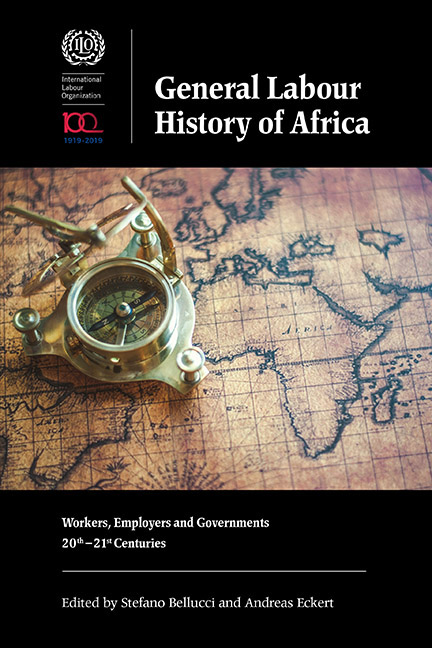Book contents
- Frontmatter
- Contents
- List of Maps and Figures
- List of Tables
- Notes on Contributors
- Foreword
- Acknowledgements
- The ‘Labour Question’ in Africanist Historiography
- Part I Free and Unfree Labour
- Part II Key Sectors
- Part III International Dimensions and Mobility
- 8 The International Labour Organization
- 9 Labour Migration
- Part IV Varieties of Work
- Part V Entrepreneurs and Self-Employment
- Part VI The State, Unions and Welfare
- Part VII Conclusions
- Select Bibliography
- Index
9 - Labour Migration
from Part III - International Dimensions and Mobility
Published online by Cambridge University Press: 21 September 2019
- Frontmatter
- Contents
- List of Maps and Figures
- List of Tables
- Notes on Contributors
- Foreword
- Acknowledgements
- The ‘Labour Question’ in Africanist Historiography
- Part I Free and Unfree Labour
- Part II Key Sectors
- Part III International Dimensions and Mobility
- 8 The International Labour Organization
- 9 Labour Migration
- Part IV Varieties of Work
- Part V Entrepreneurs and Self-Employment
- Part VI The State, Unions and Welfare
- Part VII Conclusions
- Select Bibliography
- Index
Summary
The history of labour migration in twentieth-century Africa is inextricable from the process of articulation of the continent to the global economy and the development of capitalist relations of production and exchange. In comparison with other regions with a history of colonial occupation, African agrarian structures at the beginning of the twentieth century were distinctive, with the exception of settler colonies of East and southern Africa, for the absence of a proprietary class concentrating and monopolizing land. Over the following decades, this sustained access to land by direct producers would prove at times an obstacle and at times an advantage in capital's attempt to mobilize a large labour force to develop large-scale mining, export-oriented agriculture and infrastructure projects. As a consequence, the massive mobilization of long-distance, periodic migrant labour had a lasting influence on the organization of production as well as on the character of labour relations across Africa, albeit in context-specific ways.
Labour migration had become one of the predominant forms of labour mobilization by the late nineteenth century. It has been argued that all African societies experienced the effects of labour migration in one way or another during the twentieth century. As will be discussed in this chapter, extra-economic coercion played no small part in ensuring that a workforce was eventually made available, frequently at low cost to employers. Chibalo in southern Africa, prestation in French West Africa, bonded labour and corvée were among the idioms of unfree labour. Poll taxes and raw violence, however central to these forms of labour mobilization, do not explain all forms of labour migration: millions of Africans migrated for work through channels – informal, clandestine or voluntary – that ran parallel to those that mobilized forced labour and that largely remained unrecorded. Over time, labour mobilization transformed the foundations of domestic agriculture and progressively locked households into commodity relations, which in turn cemented the emergence of forms of ‘free labour’ as well as of new forms of ‘unfree labour’.
This chapter is concerned with providing an overview of experiences of labour migration within the broader historical process of labour commodification. A neat distinction between free and unfree labour as well as between labour migration and other forms of migration is not always possible or analytically helpful. While some migrated for wages, others migrated as sharecroppers, and some forms of wage labour derived from earlier forms of forced and slave labour.
- Type
- Chapter
- Information
- General Labour History of AfricaWorkers, Employers and Governments, 20th-21st Centuries, pp. 265 - 298Publisher: Boydell & BrewerPrint publication year: 2019



